bio
-
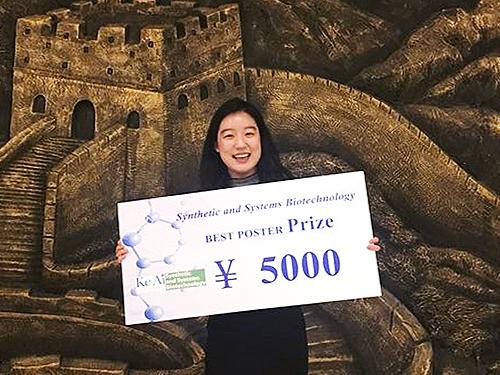 In Jin Cho Earned the Best Poster Prize at ME Summit 2017
In Jin Cho, a Ph.D. student in the Department of Chemical and Biomolecular Engineering at KAIST received the best poster prize at the International Metabolic Engineering Summit 2017 held on October 24 in Beijing, China.
The International Metabolic Engineering Summit is a global conference where scientists and corporate researchers in the field of metabolic engineering present their latest research outcomes and build networks.
At this year’s summit, about 500 researchers from around the world participated in active academic exchanges, including giving keynote speeches and presenting posters.
During the poster session, the summit selects one person for the KeAi-synthetic and Systems Biotechnology Poster Award, two for Microbial Cell Factories Poster Awards, and three for Biotechnology Journal Poster Awards among the posters presented by graduate students, post-doctoral fellows and researchers. Cho received the KeAi-synthetic and Systems Biotechnology Poster Award. Her winning poster is on the biotransformation of p-xylene to terephthalic acid using engineered Escherichia coli.
Terephthalic acid is generally produced by p-xylene oxidation; however, this process requires a high temperature and pressure as well as a toxic catalyst during the reaction process.
Cho and Ziwei Luo, a Ph.D. student at KAIST, co-conducted the research and developed a successful biological conversion process. Compared to the existing chemical process, it does not require a high temperature and pressure; and it is environmentally friendly with a relatively high conversion rate of approximately 97%.
Cho’s advisor, Distinguished Professor Sang Yup Lee said, “Further research on glucose-derived terephthalic acid will enable us to produce biomass-based eco-friendly terephthalic acid through engineered Escherichia coli.”
2017.10.31 View 11504
In Jin Cho Earned the Best Poster Prize at ME Summit 2017
In Jin Cho, a Ph.D. student in the Department of Chemical and Biomolecular Engineering at KAIST received the best poster prize at the International Metabolic Engineering Summit 2017 held on October 24 in Beijing, China.
The International Metabolic Engineering Summit is a global conference where scientists and corporate researchers in the field of metabolic engineering present their latest research outcomes and build networks.
At this year’s summit, about 500 researchers from around the world participated in active academic exchanges, including giving keynote speeches and presenting posters.
During the poster session, the summit selects one person for the KeAi-synthetic and Systems Biotechnology Poster Award, two for Microbial Cell Factories Poster Awards, and three for Biotechnology Journal Poster Awards among the posters presented by graduate students, post-doctoral fellows and researchers. Cho received the KeAi-synthetic and Systems Biotechnology Poster Award. Her winning poster is on the biotransformation of p-xylene to terephthalic acid using engineered Escherichia coli.
Terephthalic acid is generally produced by p-xylene oxidation; however, this process requires a high temperature and pressure as well as a toxic catalyst during the reaction process.
Cho and Ziwei Luo, a Ph.D. student at KAIST, co-conducted the research and developed a successful biological conversion process. Compared to the existing chemical process, it does not require a high temperature and pressure; and it is environmentally friendly with a relatively high conversion rate of approximately 97%.
Cho’s advisor, Distinguished Professor Sang Yup Lee said, “Further research on glucose-derived terephthalic acid will enable us to produce biomass-based eco-friendly terephthalic acid through engineered Escherichia coli.”
2017.10.31 View 11504 -
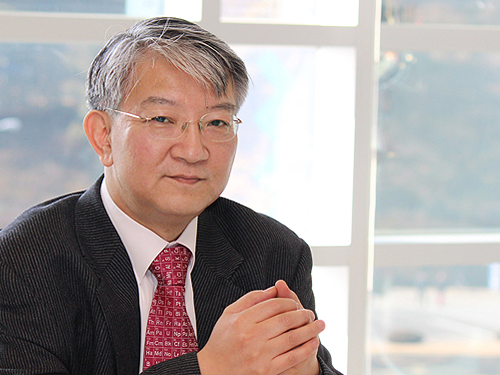 Distinguished Professor Lee Named International Fellow of the CAS
Distinguished Professor Sang Yup Lee from the Department of Chemical and Biomolecular Engineering at KAIST was awarded the title of distinguished professor and international fellow from the Chinese Academy of Sciences (CAS), and honorary professor from its affiliated organization the Tianjin Institute of Industrial Biotechnology (TIB).
The CAS recognized Distinguished Professor Lee for his significant contributions to biotechnology. He has made significant pioneering academic achievements in the area of systems metabolic engineering, which produces useful chemicals from microorganisms. Not only did he develop the first and best source technology in that field, but also came out with processes for the production of biofuel and environmentally-friendly chemicals.”
As a global leader in systems metabolic engineering, Distinguished Professor Lee has also been appointed as an honorary professor at Jiangnan University in Wuxi, China.
Distinguished Professor Lee was listed in the ‘Top 20 Translational Researchers of 2014’ selected by the renowned international journal Nature Biotechnology. Moreover, he was the first Asian recipient of the James E. Bailey Award in 2016 and Marvin J. Johnson Award in 2012, which are given to scholars in the field of biotechnology.
He is also one of 13 global scientists who are foreign members of the renowned academic societies the National Academy of Engineering and the National Academy of Sciences in the US. Furthermore, he received the ‘2017 Korea Best Scientist Award’ from the president of Korea in July. Finally, his founding field, systems metabolic engineering, was chosen as one of the ‘Top 10 Emerging Technologies of 2016’ by the World Economic Forum.
The Chinese Academy of Sciences, established in November 1949, is an academic organization that carries out research on basic sciences and natural sciences in China. It defined its science and technology system to include the fields of basic sciences, natural sciences, and high technology. While having a base in Beijing, its branch academies are located in 12 main cities along with 117 affiliates and 100 national key labs.
2017.10.26 View 13271
Distinguished Professor Lee Named International Fellow of the CAS
Distinguished Professor Sang Yup Lee from the Department of Chemical and Biomolecular Engineering at KAIST was awarded the title of distinguished professor and international fellow from the Chinese Academy of Sciences (CAS), and honorary professor from its affiliated organization the Tianjin Institute of Industrial Biotechnology (TIB).
The CAS recognized Distinguished Professor Lee for his significant contributions to biotechnology. He has made significant pioneering academic achievements in the area of systems metabolic engineering, which produces useful chemicals from microorganisms. Not only did he develop the first and best source technology in that field, but also came out with processes for the production of biofuel and environmentally-friendly chemicals.”
As a global leader in systems metabolic engineering, Distinguished Professor Lee has also been appointed as an honorary professor at Jiangnan University in Wuxi, China.
Distinguished Professor Lee was listed in the ‘Top 20 Translational Researchers of 2014’ selected by the renowned international journal Nature Biotechnology. Moreover, he was the first Asian recipient of the James E. Bailey Award in 2016 and Marvin J. Johnson Award in 2012, which are given to scholars in the field of biotechnology.
He is also one of 13 global scientists who are foreign members of the renowned academic societies the National Academy of Engineering and the National Academy of Sciences in the US. Furthermore, he received the ‘2017 Korea Best Scientist Award’ from the president of Korea in July. Finally, his founding field, systems metabolic engineering, was chosen as one of the ‘Top 10 Emerging Technologies of 2016’ by the World Economic Forum.
The Chinese Academy of Sciences, established in November 1949, is an academic organization that carries out research on basic sciences and natural sciences in China. It defined its science and technology system to include the fields of basic sciences, natural sciences, and high technology. While having a base in Beijing, its branch academies are located in 12 main cities along with 117 affiliates and 100 national key labs.
2017.10.26 View 13271 -
 Professor Jin Woo Kim Wins the 14th Macrogen Scientist Award
Professor Jin Woo Kim of the Department of Biological Sciences at KAIST received the 14th Macrogen Scientist Award at the 2017 KSMCB International Conference held in COEX on September 12, 2017.
The award is given by the Korean Society for Molecular and Cellular Biology (KSMCB) and sponsored by Macrogen, a service provider of genome research. The award was established in 2004 to recognize biological scientists who have accomplished excellent performance in the field of basic life sciences.
Professor Kim has achieved outstanding research performances on nerve development, such as identifying the cause of senile retinal degenerative disease and finding retinal nerve cells that distinguish light and darkness in dark conditions.
Recently, he discovered intercellular communication, which controls the development of retinal neurons. His findings have contributed to addressing the principles of maintenance and regeneration of retinal neurons.
Since joining KAIST, he has presented approximately 20 papers and published in numerous international journals including Cell Reports, Genes and Development, and EMBO Journal. Moreover, he delivered special lectures at international conferences, universities, and institutes around the world.
2017.09.14 View 10436
Professor Jin Woo Kim Wins the 14th Macrogen Scientist Award
Professor Jin Woo Kim of the Department of Biological Sciences at KAIST received the 14th Macrogen Scientist Award at the 2017 KSMCB International Conference held in COEX on September 12, 2017.
The award is given by the Korean Society for Molecular and Cellular Biology (KSMCB) and sponsored by Macrogen, a service provider of genome research. The award was established in 2004 to recognize biological scientists who have accomplished excellent performance in the field of basic life sciences.
Professor Kim has achieved outstanding research performances on nerve development, such as identifying the cause of senile retinal degenerative disease and finding retinal nerve cells that distinguish light and darkness in dark conditions.
Recently, he discovered intercellular communication, which controls the development of retinal neurons. His findings have contributed to addressing the principles of maintenance and regeneration of retinal neurons.
Since joining KAIST, he has presented approximately 20 papers and published in numerous international journals including Cell Reports, Genes and Development, and EMBO Journal. Moreover, he delivered special lectures at international conferences, universities, and institutes around the world.
2017.09.14 View 10436 -
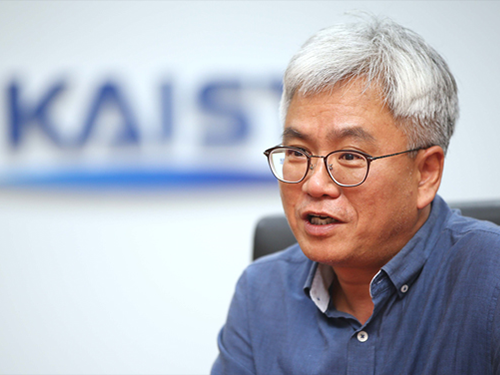 Professor Dae-Sik Im to Head the Science, Technology and Innovation Office at the Ministry of Science & ICT
(Professor Dae-Sik Im of the Department of Biological Sciences)
Professor Dae-Sik Im of the Department of Biological Sciences, a renowned molecular cell biologist, was named to head the Science, Technology and Innovation Office in the Ministry of Science and ICT on August 31. He will be responsible for the oversight of national R&D projects as well as budget deliberation. Joining the KAIST faculty in 2002, he led the Creative Research Center of Cell Division and Differentiation at KAIST.
Announcing the nomination of Professor Im, Cheong Wa Dae spokesman Park Soo-Hyun said, “Professor Im will be the best person to lead the innovation of the research infrastructure system for basic research studies. We believe that his expertise and leadership will make a significant impact in enhancing the nation’s science and technology competitiveness. This vice minister position in the Ministry of Science and ICT was newly created in an effort to enhance national science and technology initiatives by President Moon Jae-In.
Professor Im said at the news conference, “I would like to make a sustainable, as well as credible, system ensuring the ingenuity of scientists in Korean labs. To this end, I will make every effort to enhance Korea’s innovative research environment in a way to maximize research achievements.”
2017.09.03 View 10440
Professor Dae-Sik Im to Head the Science, Technology and Innovation Office at the Ministry of Science & ICT
(Professor Dae-Sik Im of the Department of Biological Sciences)
Professor Dae-Sik Im of the Department of Biological Sciences, a renowned molecular cell biologist, was named to head the Science, Technology and Innovation Office in the Ministry of Science and ICT on August 31. He will be responsible for the oversight of national R&D projects as well as budget deliberation. Joining the KAIST faculty in 2002, he led the Creative Research Center of Cell Division and Differentiation at KAIST.
Announcing the nomination of Professor Im, Cheong Wa Dae spokesman Park Soo-Hyun said, “Professor Im will be the best person to lead the innovation of the research infrastructure system for basic research studies. We believe that his expertise and leadership will make a significant impact in enhancing the nation’s science and technology competitiveness. This vice minister position in the Ministry of Science and ICT was newly created in an effort to enhance national science and technology initiatives by President Moon Jae-In.
Professor Im said at the news conference, “I would like to make a sustainable, as well as credible, system ensuring the ingenuity of scientists in Korean labs. To this end, I will make every effort to enhance Korea’s innovative research environment in a way to maximize research achievements.”
2017.09.03 View 10440 -
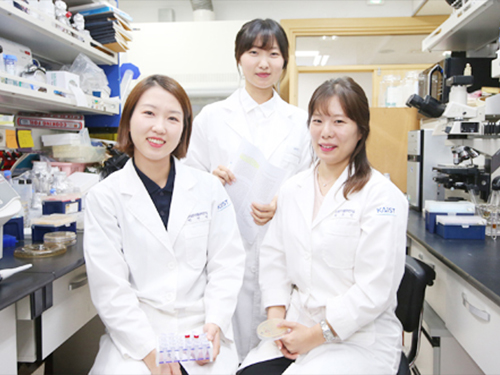 KAIST Researchers Receive Awards at the 13th Asian Congress on Biotechnology
(From left: Seon Young Park, Dr. So Young Choi, and Yoojin Choi)
Researchers in the laboratory of KAIST Distinguished Professor Sang Yup Lee from the Department of Chemical and Biomolecular Engineering swept awards at the 13th Asian Congress on Biotechnology held in Thailand last month. The conference awarded a total of eight prizes in the areas of best research and best poster presentation. This is an exceptional case in which members of one research team received almost half of the awards at an international conference.
Dr. So Young Choi received the Best Research Award, while Ph.D. candidates Yoojin Choi and Seon Young Park each received the Best Poster Presentation Award at the conference held in Khon Kaen, Thailand from July 23 to 27.
The Asian Congress on Biotechnology is an international conference in which scientists and industry experts in Asia and from around the world gather to present recent research findings in the field of biotechnology. At the conference, around 400 researchers in biotechnology from 25 countries, including Korea, gathered to present and discuss various research findings under the theme of “Bioinnovation and Bioeconomy.”
Distinguished Professor Sang Yup Lee attended the conference to give the opening plenary lecture on the topic of ‘Systems Strategies in Biotechnology.’ Professor Lee announced, “I have attended international conferences with students for the last 20 years, but this is the first in which my team received three awards at an international conference that only honors a total of eight awards, three for Best Research and five for Best Presentation.”
Dr. Choi presented research results on poly (lactate-co-glycolate) (PLGA) synthesis through a biological method using micro-organisms and received the Best Research Award. PLGA is a random copolymer of DL-lactic and glycolic acids and is a biopolymer widely used for biomedical applications. PLGA is biodegradable, biocompatible, and nontoxic, and thus has been approved by the US Food and Drug Administration (FDA) for its use in implants, drug delivery, and sutures.
Dr. Choi’s research was deemed to be innovative for synthesizing PLGA from glucose and xylose in cells through metabolic engineering of E.Coli. Dr. Choi received her Ph.D. under the supervision of Distinguished Professor Lee this February and is currently conducting post-doc research.
Ph.D. candidate Choi presented her research on the use of recombinant E.Coli for the biological synthesis of various nanoparticles and received the Best Poster Presentation award. Choi used recombinant E.Coli-expressing proteins and peptides that adsorb to heavy metals to biologically synthesize diverse metal nanoparticles such as single-nanoparticle including gold and silver, quantum dots, and magnetic nanoparticles for the first time. The synthesized nanoparticles can be used in the fields of bio-imaging, diagnosis, environment, and energy.
Ph.D. candidate Park, who also received the Best Poster Presentation award, synthesized and increased production of astanxanthin, a strong antioxidant found in nature, in E.Coli using metabolic engineering. Astanxanthin is a carotenoid pigment found in salmon and shrimp that widely used in health products and cosmetics.
2017.08.01 View 16273
KAIST Researchers Receive Awards at the 13th Asian Congress on Biotechnology
(From left: Seon Young Park, Dr. So Young Choi, and Yoojin Choi)
Researchers in the laboratory of KAIST Distinguished Professor Sang Yup Lee from the Department of Chemical and Biomolecular Engineering swept awards at the 13th Asian Congress on Biotechnology held in Thailand last month. The conference awarded a total of eight prizes in the areas of best research and best poster presentation. This is an exceptional case in which members of one research team received almost half of the awards at an international conference.
Dr. So Young Choi received the Best Research Award, while Ph.D. candidates Yoojin Choi and Seon Young Park each received the Best Poster Presentation Award at the conference held in Khon Kaen, Thailand from July 23 to 27.
The Asian Congress on Biotechnology is an international conference in which scientists and industry experts in Asia and from around the world gather to present recent research findings in the field of biotechnology. At the conference, around 400 researchers in biotechnology from 25 countries, including Korea, gathered to present and discuss various research findings under the theme of “Bioinnovation and Bioeconomy.”
Distinguished Professor Sang Yup Lee attended the conference to give the opening plenary lecture on the topic of ‘Systems Strategies in Biotechnology.’ Professor Lee announced, “I have attended international conferences with students for the last 20 years, but this is the first in which my team received three awards at an international conference that only honors a total of eight awards, three for Best Research and five for Best Presentation.”
Dr. Choi presented research results on poly (lactate-co-glycolate) (PLGA) synthesis through a biological method using micro-organisms and received the Best Research Award. PLGA is a random copolymer of DL-lactic and glycolic acids and is a biopolymer widely used for biomedical applications. PLGA is biodegradable, biocompatible, and nontoxic, and thus has been approved by the US Food and Drug Administration (FDA) for its use in implants, drug delivery, and sutures.
Dr. Choi’s research was deemed to be innovative for synthesizing PLGA from glucose and xylose in cells through metabolic engineering of E.Coli. Dr. Choi received her Ph.D. under the supervision of Distinguished Professor Lee this February and is currently conducting post-doc research.
Ph.D. candidate Choi presented her research on the use of recombinant E.Coli for the biological synthesis of various nanoparticles and received the Best Poster Presentation award. Choi used recombinant E.Coli-expressing proteins and peptides that adsorb to heavy metals to biologically synthesize diverse metal nanoparticles such as single-nanoparticle including gold and silver, quantum dots, and magnetic nanoparticles for the first time. The synthesized nanoparticles can be used in the fields of bio-imaging, diagnosis, environment, and energy.
Ph.D. candidate Park, who also received the Best Poster Presentation award, synthesized and increased production of astanxanthin, a strong antioxidant found in nature, in E.Coli using metabolic engineering. Astanxanthin is a carotenoid pigment found in salmon and shrimp that widely used in health products and cosmetics.
2017.08.01 View 16273 -
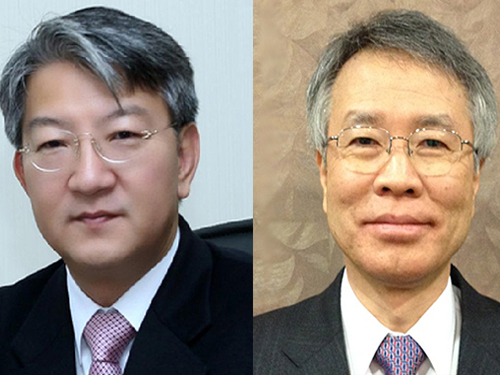 KAIST Professors Sweep the Best Science and Technology Award
(Distinguished Professors Sang Yup Lee (left) and Kyu-Young Whang)
Distinguished Professors Sang Yup Lee from the Department of Chemical and Biomolecular Engineering and Kyu-Young Whang of the College of Computing were selected as the winners of the "2017 Korea Best Science and Technology Award" by the Ministry of Science, ICT and Future Planning (MSIP) and the Korea Federation of Science and Technology Societies.
The award, which was established in 2003, is the highest honor bestowed to the two most outstanding scientists in Korea annually. This is the first time that KAIST faculty members have swept the award since its founding.
Distinguished Professor Lee is renowned for his pioneering studies of system metabolic engineering, which produces useful chemicals by utilizing microorganisms. Professor Lee has developed a number of globally-recognized original technologies such as gasoline production using micro-organisms, a bio-butanol production process, microbes for producing nylon and plastic raw materials, and making native-like spider silk produced in metabolically engineering bacterium which is stronger than steel but finer than human hair.
System metabolism engineering was also selected as one of the top 10 promising technologies in the world in 2016 by the World Economic Forum. Selected as one of the world’s top 20 applied bioscientists in 2014 by Nature Biotechnology, he has many ‘first’ titles in his academic and research careers. He was the first Asian to win the James Bailey Award (2016) and Marvin Johnson Award (2012), the first Korean elected to both the US National Academy of Science (NAS) and the National Academy of Engineering (NAE) this year. He is the dean of KAIST institutes, a multi and interdisciplinary research institute at KAIST. He serves as co-chair of the Global Council on Biotechnology and as a member of the Global Future Council on the Fourth Industrial Revolution at the World Economic Forum.
Distinguished Professor Whang, the first recipient in the field of computer science in this award, has been recognized for his lifetime achievement and contributions to the development of the software industry and the spreading of information culture. He has taken a pioneering role in presenting novel theories and innovative technologies in the field of database systems such as probabilistic aggregation, multidimensional indexing, query, and database and information retrieval. The Odysseus database management system Professor Hwang developed has been applied in many diverse fields of industry, while promoting the domestic software industry and its technical independence.
Professor Hwang is a fellow at the American Computer Society (ACM) and life fellow at IEEE. Professor Whang received the ACM SIGMOD Contributions Award in 2014 for his work promoting database research worldwide, the PAKDD Distinguished Contributions Award in 2014, and the DASFAA Outstanding Contributions Award in 2011 for his contributions to database and data mining research in the Asia-Pacific region. He is also the recipient of the prestigious Korea (presidential) Engineering Award in 2012.
2017.07.03 View 12625
KAIST Professors Sweep the Best Science and Technology Award
(Distinguished Professors Sang Yup Lee (left) and Kyu-Young Whang)
Distinguished Professors Sang Yup Lee from the Department of Chemical and Biomolecular Engineering and Kyu-Young Whang of the College of Computing were selected as the winners of the "2017 Korea Best Science and Technology Award" by the Ministry of Science, ICT and Future Planning (MSIP) and the Korea Federation of Science and Technology Societies.
The award, which was established in 2003, is the highest honor bestowed to the two most outstanding scientists in Korea annually. This is the first time that KAIST faculty members have swept the award since its founding.
Distinguished Professor Lee is renowned for his pioneering studies of system metabolic engineering, which produces useful chemicals by utilizing microorganisms. Professor Lee has developed a number of globally-recognized original technologies such as gasoline production using micro-organisms, a bio-butanol production process, microbes for producing nylon and plastic raw materials, and making native-like spider silk produced in metabolically engineering bacterium which is stronger than steel but finer than human hair.
System metabolism engineering was also selected as one of the top 10 promising technologies in the world in 2016 by the World Economic Forum. Selected as one of the world’s top 20 applied bioscientists in 2014 by Nature Biotechnology, he has many ‘first’ titles in his academic and research careers. He was the first Asian to win the James Bailey Award (2016) and Marvin Johnson Award (2012), the first Korean elected to both the US National Academy of Science (NAS) and the National Academy of Engineering (NAE) this year. He is the dean of KAIST institutes, a multi and interdisciplinary research institute at KAIST. He serves as co-chair of the Global Council on Biotechnology and as a member of the Global Future Council on the Fourth Industrial Revolution at the World Economic Forum.
Distinguished Professor Whang, the first recipient in the field of computer science in this award, has been recognized for his lifetime achievement and contributions to the development of the software industry and the spreading of information culture. He has taken a pioneering role in presenting novel theories and innovative technologies in the field of database systems such as probabilistic aggregation, multidimensional indexing, query, and database and information retrieval. The Odysseus database management system Professor Hwang developed has been applied in many diverse fields of industry, while promoting the domestic software industry and its technical independence.
Professor Hwang is a fellow at the American Computer Society (ACM) and life fellow at IEEE. Professor Whang received the ACM SIGMOD Contributions Award in 2014 for his work promoting database research worldwide, the PAKDD Distinguished Contributions Award in 2014, and the DASFAA Outstanding Contributions Award in 2011 for his contributions to database and data mining research in the Asia-Pacific region. He is also the recipient of the prestigious Korea (presidential) Engineering Award in 2012.
2017.07.03 View 12625 -
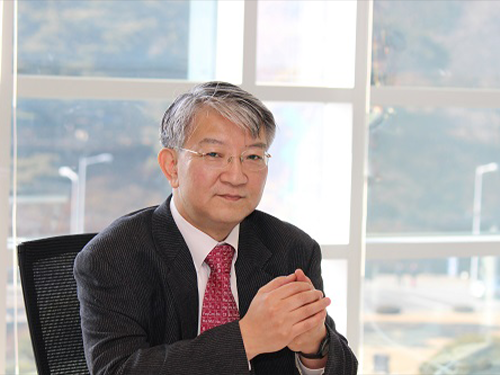 Distinguished Professor Lee Elected to the NAS
Distinguished Professor Sang Yup Lee of the Department of Chemical and Biomolecular Engineering was elected as a foreign associate to the US National Academy of Sciences (NAS) on May 2. The National Academy of Sciences elected 84 new members and 21 foreign associates in recognition of their distinguished and continuing achievements in their original research. Election to the Academy is widely regarded as one of the highest honors that a scientist can receive.
Professor Lee was also elected in 2010 as a member of the US National Academy of Engineering (NAE) for his leadership in microbial biotechnology and metabolic engineering, including the development of fermentation processes for biodegradable polymers and organic acids. Until 2016, there are only 12 people worldwide who are foreign associates of both NAS and NAE.
He is the first Korean elected to both prestigious academies, the NAS and the NAE in the US. Professor Lee is currently the dean of KAIST Institutes, the world leading institute for multi-and interdisciplinary research. He is also serving as co-chair of the Global Council on Biotechnology and member of the Global Future Council on the Fourth Industrial Revolution, the World Economic Forum.
2017.05.16 View 11170
Distinguished Professor Lee Elected to the NAS
Distinguished Professor Sang Yup Lee of the Department of Chemical and Biomolecular Engineering was elected as a foreign associate to the US National Academy of Sciences (NAS) on May 2. The National Academy of Sciences elected 84 new members and 21 foreign associates in recognition of their distinguished and continuing achievements in their original research. Election to the Academy is widely regarded as one of the highest honors that a scientist can receive.
Professor Lee was also elected in 2010 as a member of the US National Academy of Engineering (NAE) for his leadership in microbial biotechnology and metabolic engineering, including the development of fermentation processes for biodegradable polymers and organic acids. Until 2016, there are only 12 people worldwide who are foreign associates of both NAS and NAE.
He is the first Korean elected to both prestigious academies, the NAS and the NAE in the US. Professor Lee is currently the dean of KAIST Institutes, the world leading institute for multi-and interdisciplinary research. He is also serving as co-chair of the Global Council on Biotechnology and member of the Global Future Council on the Fourth Industrial Revolution, the World Economic Forum.
2017.05.16 View 11170 -
 Professor Won Do Heo Receives 'Scientist of the Month Award'
Professor Won Do Heo of the Department of Biological Sciences was selected as the “Scientist of the Month” for April 2017 by the Ministry of Science, ICT and Future Planning and the National Research Foundation of Korea.
Professor Heo was recognized for his suggestion of a new biological research method developing various optogenetics technology which controls cell function by using light. He developed the technology using lasers or LED light, without the need for surgery or drug administration, to identify the cause of diseases related to calcium ions such as Alzheimer’s disease and cancer.
The general technique used in optogenetics, that control cells in the body with light, is the simple activation and deactivation of neurons.
Professor Heo developed a calcium ion channel activation technique (OptoSTIM1) to activate calcium ions in the body using light. He also succeeded in increasing calcium concentrations with light to enhance the memory capacity of mice two-fold.
Using this technology, the desired amount and residing time of calcium ion influx can be controlled by changing light intensity and exposure periods, enabling the function of a single cell or various cells in animal tissue to be controlled remotely.
The experimental results showed that calcium ion influx can be activated in cells that are affected by calcium ions, such as normal cells, cancer cells, and human embryonic stem cells. By controlling calcium concentrations with light, it is possible to control biological phenomena, such as cellular growth, neurotransmitter transmission, muscle contraction, and hormone control.
Professor Heo said, “Until now, it was standard to use optogenetics to activate neurons using channelrhodopsin. The development of this new optogenetic technique using calcium ion channel activation can be applied to various biological studies, as well as become an essential research technique in neurobiology.
The “Scientist of the Month Award” is given every month to one researcher who made significant contributions to the advancement of science and technology with their outstanding research achievement. The awardee will receive prize money of ten million won.
2017.04.07 View 9797
Professor Won Do Heo Receives 'Scientist of the Month Award'
Professor Won Do Heo of the Department of Biological Sciences was selected as the “Scientist of the Month” for April 2017 by the Ministry of Science, ICT and Future Planning and the National Research Foundation of Korea.
Professor Heo was recognized for his suggestion of a new biological research method developing various optogenetics technology which controls cell function by using light. He developed the technology using lasers or LED light, without the need for surgery or drug administration, to identify the cause of diseases related to calcium ions such as Alzheimer’s disease and cancer.
The general technique used in optogenetics, that control cells in the body with light, is the simple activation and deactivation of neurons.
Professor Heo developed a calcium ion channel activation technique (OptoSTIM1) to activate calcium ions in the body using light. He also succeeded in increasing calcium concentrations with light to enhance the memory capacity of mice two-fold.
Using this technology, the desired amount and residing time of calcium ion influx can be controlled by changing light intensity and exposure periods, enabling the function of a single cell or various cells in animal tissue to be controlled remotely.
The experimental results showed that calcium ion influx can be activated in cells that are affected by calcium ions, such as normal cells, cancer cells, and human embryonic stem cells. By controlling calcium concentrations with light, it is possible to control biological phenomena, such as cellular growth, neurotransmitter transmission, muscle contraction, and hormone control.
Professor Heo said, “Until now, it was standard to use optogenetics to activate neurons using channelrhodopsin. The development of this new optogenetic technique using calcium ion channel activation can be applied to various biological studies, as well as become an essential research technique in neurobiology.
The “Scientist of the Month Award” is given every month to one researcher who made significant contributions to the advancement of science and technology with their outstanding research achievement. The awardee will receive prize money of ten million won.
2017.04.07 View 9797 -
 A KAIST Team Wins the Chem-E-Car Competition 2016
A KAIST team consisted of four students from the Department of Chemical and Biomolecular Engineering won the Chem-E-Car Competition 2016, which took place on November 13 at the Union Square in San Francisco. The students who participated were Young-Hyun Cha, Jin-Sol Shin, Dae-Seok Oh, and Wan-Tae Kim. Their adviser was Professor Doh Chang Lee of the same department.
Established in 1999, the Chem-E-Car is an annual worldwide college competition for students majoring in chemical engineering. The American Institute of Chemical Engineers (AIChE), founded in 1908, is the world’s leading organization for chemical engineering professionals with more than 50,000 members from over 100 countries and hosts this competition every year.
A total of 41 university teams including Carnegie Mellon University and Purdue University participated in this year’s competition.
KAIST students competed in the event for the first time in 2014 and reached the rank of 28. In 2015, the students placed 16th, and finally, took the first place in last month’s competition, followed by the Georgia Institute of Technology.
In the competition, students must design small-scale (20x30x40 cm) automobiles that operate chemically, as well as describe their research and drive their car a fixed distance down a wedge-shaped course to demonstrate the car’s capabilities. In addition to driving a specified distance (15-30 meters), the car must hold a payload of 0-500 mL of water.
The organizers tell participants the exact distance and amount of payloads one hour before the competition begins. Winners are chosen based on their finishing time and how close their car reaches the finish line. Thus, students must show sophisticated coordination of chemical reactions to win.
The KAIST team designed their car to have a stable power output using a Vanadium redox flow battery developed by Professor Hee Tak Kim of Chemical and Biomolecular Engineering. They employed iodine clock reactions to induce quick and precise chemical reactions to control their car.
KAIST’s car finished with the best run coming within 11 cm of the target line; Georgia Tech’s car reached the finish line by 13 cm and New Jersey Institute of Technology’s car by 14 cm.
Young-Hyun Cha, one of the four students, said, “When we first designed our car, we had to deal with many issues such as stalls or connection errors. We kept working on fixing these problems through trial and error, which eventually led us to success.”
For a news article on KAIST’s win at 2016 Chemi-E-Car Competition by AIChE, see the link below:
http://www.aiche.org/chenected/2016/11/koreas-kaist-wins-1st-place-2016-chem-e-car-competition-photos
2016.12.08 View 12012
A KAIST Team Wins the Chem-E-Car Competition 2016
A KAIST team consisted of four students from the Department of Chemical and Biomolecular Engineering won the Chem-E-Car Competition 2016, which took place on November 13 at the Union Square in San Francisco. The students who participated were Young-Hyun Cha, Jin-Sol Shin, Dae-Seok Oh, and Wan-Tae Kim. Their adviser was Professor Doh Chang Lee of the same department.
Established in 1999, the Chem-E-Car is an annual worldwide college competition for students majoring in chemical engineering. The American Institute of Chemical Engineers (AIChE), founded in 1908, is the world’s leading organization for chemical engineering professionals with more than 50,000 members from over 100 countries and hosts this competition every year.
A total of 41 university teams including Carnegie Mellon University and Purdue University participated in this year’s competition.
KAIST students competed in the event for the first time in 2014 and reached the rank of 28. In 2015, the students placed 16th, and finally, took the first place in last month’s competition, followed by the Georgia Institute of Technology.
In the competition, students must design small-scale (20x30x40 cm) automobiles that operate chemically, as well as describe their research and drive their car a fixed distance down a wedge-shaped course to demonstrate the car’s capabilities. In addition to driving a specified distance (15-30 meters), the car must hold a payload of 0-500 mL of water.
The organizers tell participants the exact distance and amount of payloads one hour before the competition begins. Winners are chosen based on their finishing time and how close their car reaches the finish line. Thus, students must show sophisticated coordination of chemical reactions to win.
The KAIST team designed their car to have a stable power output using a Vanadium redox flow battery developed by Professor Hee Tak Kim of Chemical and Biomolecular Engineering. They employed iodine clock reactions to induce quick and precise chemical reactions to control their car.
KAIST’s car finished with the best run coming within 11 cm of the target line; Georgia Tech’s car reached the finish line by 13 cm and New Jersey Institute of Technology’s car by 14 cm.
Young-Hyun Cha, one of the four students, said, “When we first designed our car, we had to deal with many issues such as stalls or connection errors. We kept working on fixing these problems through trial and error, which eventually led us to success.”
For a news article on KAIST’s win at 2016 Chemi-E-Car Competition by AIChE, see the link below:
http://www.aiche.org/chenected/2016/11/koreas-kaist-wins-1st-place-2016-chem-e-car-competition-photos
2016.12.08 View 12012 -
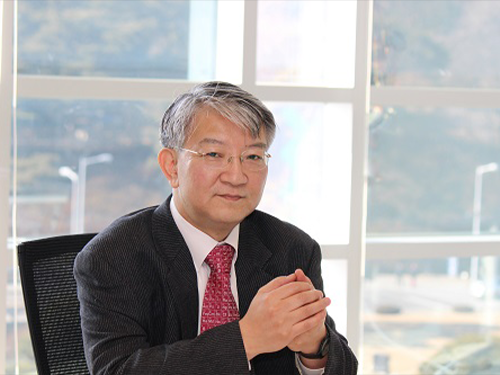 Professor Lee Co-chairs the Global Future Councils on Biotechnology of the WEF
The World Economic Forum (WEF) established a new global network of the world’s leading experts, “The Annual Meeting of the Global Future Councils,” to explore innovative solutions for the most pressing global challenges. The Councils’ first meeting took place on November 13-14, 2016, in Dubai, the United Arab Emirates (UAE). Some 25 nations joined as member states. The Councils have 35 committees.
Over 700 global leaders in business, government, civil society and academia gathered at the inaugural meeting to “develop ideas and strategies to prepare the world for the Fourth Industrial Revolution, with topics including smart cities, robotics, and the future of mobility,” according to a statement issued by the WEF.
Distinguished Professor Sang Yup Lee of Chemical and Biomolecular Engineering at KAIST was appointed to co-chair one of the Councils' committees, The Annual Meeting of the Global Future Councils on Biotechnology, for two years. The other chairperson is Dr. Feng Zhang, a professor of Biomedical Engineering at the Massachusetts Institute of Technology (MIT), who played a critical role in the development of optogenetics and CRISPR technologies.
The Biotechnology Committee consists of 24 globally recognized professionals in life sciences, law, ethics and policy including Thomas Connelly, the executive director of the American Chemical Society, Tina Fano, the executive vice president of Novozymes, and Mostafa Ronaghi, the chief technology officer of Illumina.
Professor Lee also serves as a committee member of The Annual Meeting of the Global Future Councils on the Fourth Industrial Revolution.
“Life sciences and engineering will receive more attention as a key element of the Fourth Industrial Revolution that the global society as a whole has been experiencing now. Together with thought leaders gathered worldwide, I will join the international community’s concerted efforts to address issues of importance that impact greatly on the future of humanity,” Professor Lee said.
In addition, Professor Lee received the James E. Bailey Award 2016 from The Society for Biological Engineering on November 15, 2016. He is the first Asian researcher to be recognized for his contributions to the field of biotechnology.
2016.11.15 View 10630
Professor Lee Co-chairs the Global Future Councils on Biotechnology of the WEF
The World Economic Forum (WEF) established a new global network of the world’s leading experts, “The Annual Meeting of the Global Future Councils,” to explore innovative solutions for the most pressing global challenges. The Councils’ first meeting took place on November 13-14, 2016, in Dubai, the United Arab Emirates (UAE). Some 25 nations joined as member states. The Councils have 35 committees.
Over 700 global leaders in business, government, civil society and academia gathered at the inaugural meeting to “develop ideas and strategies to prepare the world for the Fourth Industrial Revolution, with topics including smart cities, robotics, and the future of mobility,” according to a statement issued by the WEF.
Distinguished Professor Sang Yup Lee of Chemical and Biomolecular Engineering at KAIST was appointed to co-chair one of the Councils' committees, The Annual Meeting of the Global Future Councils on Biotechnology, for two years. The other chairperson is Dr. Feng Zhang, a professor of Biomedical Engineering at the Massachusetts Institute of Technology (MIT), who played a critical role in the development of optogenetics and CRISPR technologies.
The Biotechnology Committee consists of 24 globally recognized professionals in life sciences, law, ethics and policy including Thomas Connelly, the executive director of the American Chemical Society, Tina Fano, the executive vice president of Novozymes, and Mostafa Ronaghi, the chief technology officer of Illumina.
Professor Lee also serves as a committee member of The Annual Meeting of the Global Future Councils on the Fourth Industrial Revolution.
“Life sciences and engineering will receive more attention as a key element of the Fourth Industrial Revolution that the global society as a whole has been experiencing now. Together with thought leaders gathered worldwide, I will join the international community’s concerted efforts to address issues of importance that impact greatly on the future of humanity,” Professor Lee said.
In addition, Professor Lee received the James E. Bailey Award 2016 from The Society for Biological Engineering on November 15, 2016. He is the first Asian researcher to be recognized for his contributions to the field of biotechnology.
2016.11.15 View 10630 -
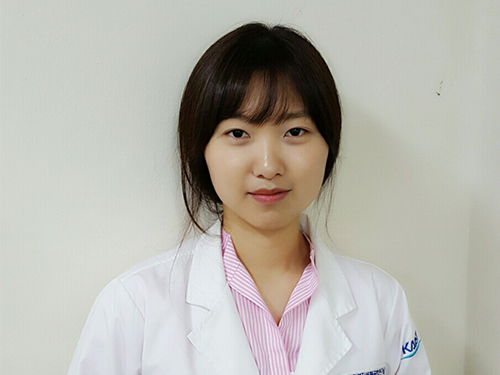 Doctoral Student Receives the Best Paper Award from the International Metabolic Engineering Conference 2016
So Young Choi, a Ph.D. candidate at the Department of Chemical and Biomolecular Engineering at KAIST, received the Student and Young Investigator Poster Award at the 11th International Metabolic Engineering Conference held in Awaji, Japan on June 26-30.
Choi received the award for her research on one-step fermentative production of Poly(lactate-co-glycolate) (PLGA) from carbohydrates in Escherichia coli, which was published in the April 2016 issue of Nature Biotechnology.
In her paper, she presented a novel technology to synthesize PLGA, a non-natural copolymer, through a biological production process. Because of its biodegradability, non-toxicity, and biocompatibility, PLGA is widely used in biomedical and therapeutic applications, including surgical sutures, prosthetic devices, drug delivery, and tissue engineering.
Employing a metabolic engineering approach, Choi manipulated the metabolic pathway of an Escherichia coli bacterium to convert glucose and xylose into the biosynthesis of PLGA within the cell. Previously, PLGA could be obtained only through chemical synthesis.
Choi said, “I’m thrilled to receive an award from a flagship conference of my research field. Mindful of this recognition, I will continue my research to produce meaningful results, thereby contributing to the development of science and technology in Korea.”
The International Metabolic Engineering Conference is a leading professional gathering where state-of-the-art developments and achievements made in the field of metabolic engineering are shared. With the participation of about 400 professionals from all around the world, the conference participants discussed this year’s theme of “Design, Synthesis and System Integration for Metabolic Engineering.”
2016.07.07 View 12018
Doctoral Student Receives the Best Paper Award from the International Metabolic Engineering Conference 2016
So Young Choi, a Ph.D. candidate at the Department of Chemical and Biomolecular Engineering at KAIST, received the Student and Young Investigator Poster Award at the 11th International Metabolic Engineering Conference held in Awaji, Japan on June 26-30.
Choi received the award for her research on one-step fermentative production of Poly(lactate-co-glycolate) (PLGA) from carbohydrates in Escherichia coli, which was published in the April 2016 issue of Nature Biotechnology.
In her paper, she presented a novel technology to synthesize PLGA, a non-natural copolymer, through a biological production process. Because of its biodegradability, non-toxicity, and biocompatibility, PLGA is widely used in biomedical and therapeutic applications, including surgical sutures, prosthetic devices, drug delivery, and tissue engineering.
Employing a metabolic engineering approach, Choi manipulated the metabolic pathway of an Escherichia coli bacterium to convert glucose and xylose into the biosynthesis of PLGA within the cell. Previously, PLGA could be obtained only through chemical synthesis.
Choi said, “I’m thrilled to receive an award from a flagship conference of my research field. Mindful of this recognition, I will continue my research to produce meaningful results, thereby contributing to the development of science and technology in Korea.”
The International Metabolic Engineering Conference is a leading professional gathering where state-of-the-art developments and achievements made in the field of metabolic engineering are shared. With the participation of about 400 professionals from all around the world, the conference participants discussed this year’s theme of “Design, Synthesis and System Integration for Metabolic Engineering.”
2016.07.07 View 12018 -
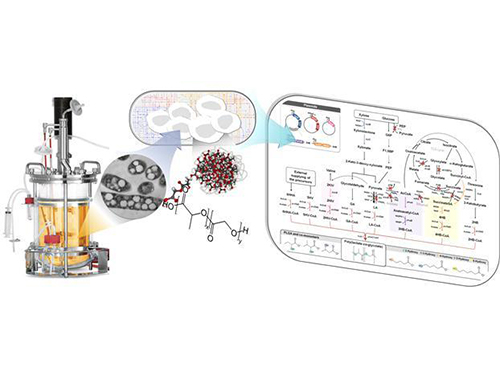 Top 10 Emerging Technologies by World Economic Forum
The World Economic Forum’s Meta-Council on Emerging Technologies announced its annual list of breakthrough technologies, the “Top 10 Emerging Technologies of 2016,” on June 23, 2016. The Meta-Council chose the top ten technologies based on the technologies’ potential to improve lives, transform industries, and safeguard the planet. The research field of systems metabolic engineering, founded by Distinguished Professor Sang Yup Lee of the Chemical and Biomolecular Engineering Department at KAIST, was also citied. Systems metabolic engineering, which combines elements of synthetic biology, systems biology, and evolutionary engineering, offers a sustainable process for the production of useful chemicals in an environmentally friendly way from plants such as inedible biomass, reducing the need of using fossil fuels. Details about the list follow below:
https://www.weforum.org/press/2016/06/battery-powered-villages-sociable-robots-rank-among-top-10-emerging-technologies-of-2016
The picture below shows the “systems metabolic engineering of E. coli for the production of PLGA." PLGA is poly(lactate-co-glycolate), which is widely used for biomedical applications, and has been made by chemical synthesis. Now it is possible to produce PLGA eco-friendly by one-step fermentation of a gut bacterium which is developed through systems metabolic engineering.
2016.06.27 View 12309
Top 10 Emerging Technologies by World Economic Forum
The World Economic Forum’s Meta-Council on Emerging Technologies announced its annual list of breakthrough technologies, the “Top 10 Emerging Technologies of 2016,” on June 23, 2016. The Meta-Council chose the top ten technologies based on the technologies’ potential to improve lives, transform industries, and safeguard the planet. The research field of systems metabolic engineering, founded by Distinguished Professor Sang Yup Lee of the Chemical and Biomolecular Engineering Department at KAIST, was also citied. Systems metabolic engineering, which combines elements of synthetic biology, systems biology, and evolutionary engineering, offers a sustainable process for the production of useful chemicals in an environmentally friendly way from plants such as inedible biomass, reducing the need of using fossil fuels. Details about the list follow below:
https://www.weforum.org/press/2016/06/battery-powered-villages-sociable-robots-rank-among-top-10-emerging-technologies-of-2016
The picture below shows the “systems metabolic engineering of E. coli for the production of PLGA." PLGA is poly(lactate-co-glycolate), which is widely used for biomedical applications, and has been made by chemical synthesis. Now it is possible to produce PLGA eco-friendly by one-step fermentation of a gut bacterium which is developed through systems metabolic engineering.
2016.06.27 View 12309